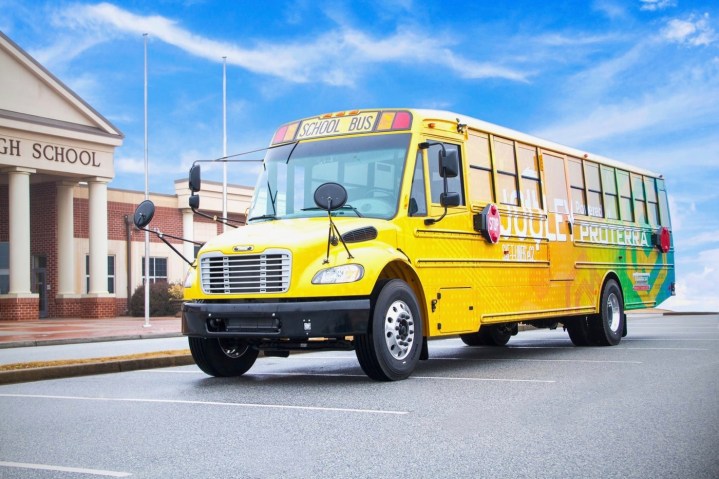
Democratic Sen. Bernie Sanders’ Green New Deal is a sweeping, $16 trillion proposal to fight climate change. But one of the specific policies called for by the Vermont senator and presidential candidate appears to already be underway. Vox notes that Sanders’ Green New Deal includes a provision for electric school buses, and some school districts are already putting those buses on the road.
About 55 percent of America’s public school students get to school on buses, and about 95 percent of those buses are diesel-powered, noted Vox. That means potential exposure to diesel fumes as kids get on and off idling buses, which could impact brain development and increase risk of respiratory disease, according to Vox, which cited multiple studies linking air pollution to these health issues.
Electric school buses could also save money. As with electric cars, maintenance costs are lower thanks to a smaller number of moving parts. Electricity is generally cheaper than diesel, too. Electric buses also don’t present as much of an inconvenience as electric cars. Because they operate on set routes that never take them far from a central depot, coordinating charging is less of an issue than it can be for passenger cars. Even if they are charged from dirty electricity grids, electric buses still produce substantially lower levels of greenhouse gas emissions than diesel buses, according to the Union of Concerned Scientists.
Sanders isn’t the only lawmaker proposing electric school buses. Fellow Democratic presidential candidate Sen. Kamala Harris of California recently introduced the Clean School Bus Act in the senate. The bill, which would authorize $1 billion to help school districts switch from diesel to electric buses, was co-signed by Sanders and Sen. Cory Booker (D-New Jersey), who is also running for president. A companion bill was introduced in the House by Rep. Jahana Hayes (D-Connecticut). But some school districts are already buying electric buses.
Blue Bird — one of the biggest manufacturers of school buses — recently announced that it had more than 100 orders for electric school buses, encompassing three different models. Some buses are already in service in California, North Dakota, and Washington state, according to the company. Blue Bird expects additional deliveries in California, as well as Colorado, New Jersey, New York, and Quebec, in late 2019 or early 2020. Thomas Built and Proterra have teamed up to develop their own electric school bus, which is expected to enter production in 2020.
Increased interest in electric school buses is a reflection of the growth in electric transit buses. These buses are already being used in China, as well as by several United States transit agencies. They’re built by specialist firms like Proterra and China’s BYD, but established manufacturers like Volvo are working on electric buses as well. California wants its entire public bus fleet to be electric by 2040.
Editors' Recommendations
- Big EVs are almost here: 7 upcoming electric SUVs we’re excited for
- Thomas Built Buses on track to deliver Virginia’s first electric school buses
- Bernie Sanders calls for a ban on police use of facial recognition


